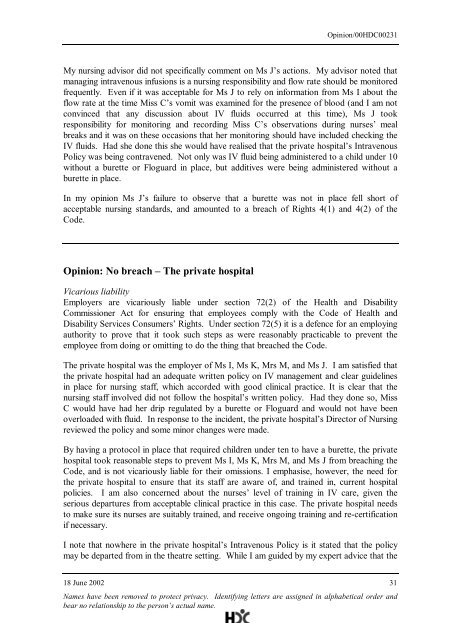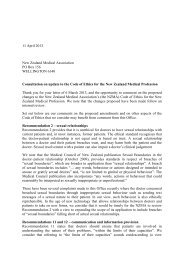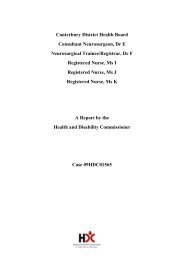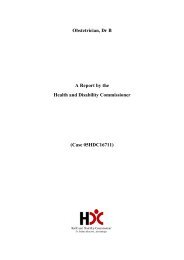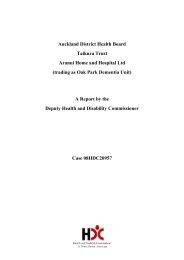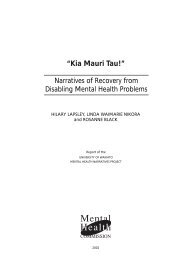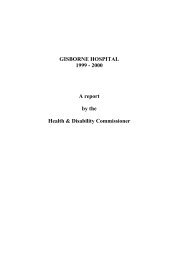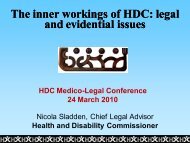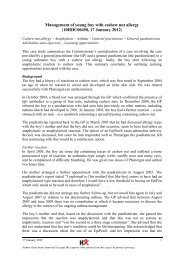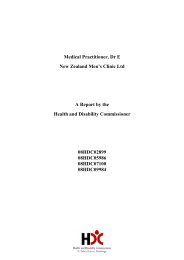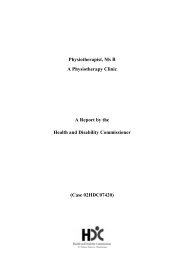Download the pdf version of this decision. - Health and Disability ...
Download the pdf version of this decision. - Health and Disability ...
Download the pdf version of this decision. - Health and Disability ...
Create successful ePaper yourself
Turn your PDF publications into a flip-book with our unique Google optimized e-Paper software.
Opinion/00HDC00231<br />
My nursing advisor did not specifically comment on Ms J’s actions. My advisor noted that<br />
managing intravenous infusions is a nursing responsibility <strong>and</strong> flow rate should be monitored<br />
frequently. Even if it was acceptable for Ms J to rely on information from Ms I about <strong>the</strong><br />
flow rate at <strong>the</strong> time Miss C’s vomit was examined for <strong>the</strong> presence <strong>of</strong> blood (<strong>and</strong> I am not<br />
convinced that any discussion about IV fluids occurred at <strong>this</strong> time), Ms J took<br />
responsibility for monitoring <strong>and</strong> recording Miss C’s observations during nurses’ meal<br />
breaks <strong>and</strong> it was on <strong>the</strong>se occasions that her monitoring should have included checking <strong>the</strong><br />
IV fluids. Had she done <strong>this</strong> she would have realised that <strong>the</strong> private hospital’s Intravenous<br />
Policy was being contravened. Not only was IV fluid being administered to a child under 10<br />
without a burette or Floguard in place, but additives were being administered without a<br />
burette in place.<br />
In my opinion Ms J’s failure to observe that a burette was not in place fell short <strong>of</strong><br />
acceptable nursing st<strong>and</strong>ards, <strong>and</strong> amounted to a breach <strong>of</strong> Rights 4(1) <strong>and</strong> 4(2) <strong>of</strong> <strong>the</strong><br />
Code.<br />
Opinion: No breach – The private hospital<br />
Vicarious liability<br />
Employers are vicariously liable under section 72(2) <strong>of</strong> <strong>the</strong> <strong>Health</strong> <strong>and</strong> <strong>Disability</strong><br />
Commissioner Act for ensuring that employees comply with <strong>the</strong> Code <strong>of</strong> <strong>Health</strong> <strong>and</strong><br />
<strong>Disability</strong> Services Consumers’ Rights. Under section 72(5) it is a defence for an employing<br />
authority to prove that it took such steps as were reasonably practicable to prevent <strong>the</strong><br />
employee from doing or omitting to do <strong>the</strong> thing that breached <strong>the</strong> Code.<br />
The private hospital was <strong>the</strong> employer <strong>of</strong> Ms I, Ms K, Mrs M, <strong>and</strong> Ms J. I am satisfied that<br />
<strong>the</strong> private hospital had an adequate written policy on IV management <strong>and</strong> clear guidelines<br />
in place for nursing staff, which accorded with good clinical practice. It is clear that <strong>the</strong><br />
nursing staff involved did not follow <strong>the</strong> hospital’s written policy. Had <strong>the</strong>y done so, Miss<br />
C would have had her drip regulated by a burette or Floguard <strong>and</strong> would not have been<br />
overloaded with fluid. In response to <strong>the</strong> incident, <strong>the</strong> private hospital’s Director <strong>of</strong> Nursing<br />
reviewed <strong>the</strong> policy <strong>and</strong> some minor changes were made.<br />
By having a protocol in place that required children under ten to have a burette, <strong>the</strong> private<br />
hospital took reasonable steps to prevent Ms I, Ms K, Mrs M, <strong>and</strong> Ms J from breaching <strong>the</strong><br />
Code, <strong>and</strong> is not vicariously liable for <strong>the</strong>ir omissions. I emphasise, however, <strong>the</strong> need for<br />
<strong>the</strong> private hospital to ensure that its staff are aware <strong>of</strong>, <strong>and</strong> trained in, current hospital<br />
policies. I am also concerned about <strong>the</strong> nurses’ level <strong>of</strong> training in IV care, given <strong>the</strong><br />
serious departures from acceptable clinical practice in <strong>this</strong> case. The private hospital needs<br />
to make sure its nurses are suitably trained, <strong>and</strong> receive ongoing training <strong>and</strong> re-certification<br />
if necessary.<br />
I note that nowhere in <strong>the</strong> private hospital’s Intravenous Policy is it stated that <strong>the</strong> policy<br />
may be departed from in <strong>the</strong> <strong>the</strong>atre setting. While I am guided by my expert advice that <strong>the</strong><br />
18 June 2002 31<br />
Names have been removed to protect privacy. Identifying letters are assigned in alphabetical order <strong>and</strong><br />
bear no relationship to <strong>the</strong> person’s actual name.


